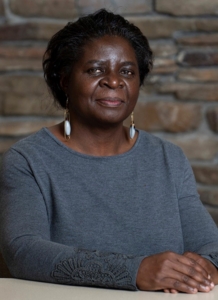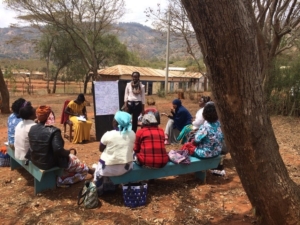
Could you tell us a bit about your background and how you became interested in global health?
I am a veterinarian by training. I also have a master’s degree in International Development, with a focus on gender and community development. My interest has always been in international development and social justice. I feel like those two things go hand-in-hand.
I was born and raised in Kenya. All throughout my life, I’ve felt that it’s so important for me to be able to work on the community-level. I especially have a soft spot for women and gender issues related to women. As a veterinarian, I’ve noticed that about 75% of the work related to livestock in Africa is actually done by women, but they don’t benefit from this work as much the men. Women provide most of the labor, yet they don’t control the resources related to livestock. That background, including my PhD in Infectious Disease, has led me to focus my career on One Health, the paradigm that encompasses different disciplines, including human health, animal health, and environmental health.
What drew you to Tufts Cumming School of Veterinary Medicine?
Before I came here to do my PhD, I had been working in the field in Africa as a gender specialist and as a veterinarian. I wanted to find a PhD program that would take me back to working in Africa, because that’s where my interest is. A lot of the faculty at Tufts were doing international projects in East Africa. I was really fortunate in that, just as I was about to finish my PhD, Tufts was awarded the Emerging Pandemic Threats grant under United States Agency for International Development (USAID). I was able to stay at Tufts and work on that project, which I am still working on today. It was a very deliberate effort I made to come to Cummings School of Veterinary Medicine because of what I’d heard about it from colleagues around the world.
What would you say is the unique role that veterinarians play in the field of global health?
Veterinarians treat infections and many zoonotic diseases (diseases transmitted from animals to humans) must involve veterinarians. Outbreaks of Rift Valley Fever, West Nile Virus, Zika Virus, and Toxoplasmosis, for example, all involve animals. There are also so many diseases that affect the food chain as well. There are some diseases that do not directly impact humans, but that affect the livelihoods of people by harming livestock species.
Veterinarians are also heavily involved in biomedical science. For my doctoral dissertation, I looked at animal models for tetanus, diphtheria, and pertussis vaccines. A lot of work around vaccine development is done in animals. Veterinarians are often responsible for this research.
These are just a couple of examples in which veterinarians are right at the center of global health. One Health, the paradigm in which human health, animal health, and environmental health is connected, is wrapped around global health. You cannot talk about global health if you don’t talk about livelihoods of people, communities that are marginalized, access to resources, or social determinants of health.
As you mentioned, One Health is becoming a popular framework for addressing a number of global health issues. Can you talk a bit about the specific One Health Fellowship Program at Tufts?
The One Health Fellowship is a program I lead at Tufts University Cummings School of Veterinary Medicine that brings together young global health leaders. We attract fellows from multiple disciplines and countries. For example, last year we had a journalist, nurse, veterinarian, dentist, technology specialist, and entrepreneur. We recognize that these different disciplines play a huge role in health for animals, people, and the environment. We have to think outside the box and reach out to all of these different disciplines and bring them together. That’s the essence of One Health. We’re trying to create a new type of global health leader, one who thinks differently, one who recognizes that they can’t be successful alone.
Please tell us about the STOP Spillover grant Tufts was awarded in 2020 and your role in the project.
STOP Spillover is another excellent example of a project encompassing this idea of One Health. STOP Spillover is a USAID-funded initiative that Tufts was selected to lead. The goal of this five-year project is to 1) understand the risk factors that contribute to viral spillover from animals to humans, 2) implement interventions at spillover points to prevent zoonotic disease, and 3) assess risk reduction practices and policies to prevent spillover and mitigate amplification and spread of disease. I serve as co-Lead of Risk Reduction, working with countries in South East Asia and Africa to build capacity to reduce the risk of viral zoonotic spillover from wildlife to humans, and amplification and spread among humans.
Can you describe the SheVax+ project at Tufts?
SheVax+ means “she vaccinates”. It’s a gender project centered in Africa that’s focused on identifying opportunities and barriers to women’s engagement in the livestock vaccine value chain. As I mentioned at the beginning, a lot of the livestock work in Africa is done by women. Additionally, many communities rely on livestock for their livelihoods. Livestock diseases are a huge issue in that part of the world. Most major livestock diseases are vaccine-preventable. It is often just an issue of vaccine accessibility.
This project involves women smallholders [small-scare farmers] in Kenya, Uganda, and Rwanda and looks for ways in which we can engage them in the livestock vaccine value chain. We are looking at the vaccine value chain, from the distributer to the manufacturers of the vaccine. We’re asking questions such as, “Are women involved in the manufacturing?” We’re also looking at who delivers the vaccine. We’re asking, “How do we ensure that women have opportunity to go to veterinary school?” We want them to be empowered to benefit from something that they’re already contributing so much to.
What advice would you give to the next generation of global health professionals?
You have to be passionate about it to do it. Global health is centered around human rights. It involves social justice and opportunities to improve livelihoods, and it must include partnerships with many different disciplines. You also have to recognize that your local partners bring a lot to the table. Working on the community-level with local people who bring so much value is very important. It’s also important to be open-minded and to understand that not everyone will think the same way that you think. Global health is a slow process, but it is important to celebrate even small successes.

